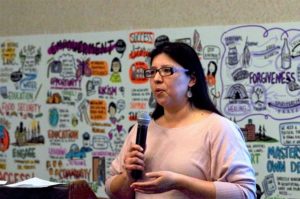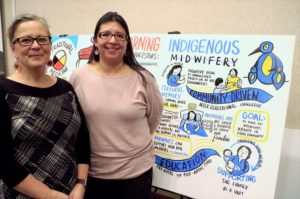Midwives in ‘very high demand’ says Wiikwemkoong citizen and registered midwife

By Rick Garrick
THUNDER BAY— The role of a midwife during pregnancy and birth and with newborns was highlighted by Indigenous midwife Lisa Bishop during her Feb. 6 Indigenous Midwifery presentation at the Matawa Health Co-op Health Forum.
“We have the knowledge of how to take care of women during pregnancy and for birth and taking care of newborns,” says Bishop, a Wiikwemkoong citizen and Indigenous registered midwife with Dilico Anishinabek Family Care in Thunder Bay. “There’s a big movement across the country with lots of support in Ontario for increasing the number of Indigenous midwives who are working.”
Bishop began working at Dilico, which provides services for Indigenous children and families in the City of Thunder Bay and District of Thunder Bay from Fort William to Michipicoten and north to Long Lake #58, in 2017.
“I really enjoy being able to do things for families that aren’t being done in the health care system in any other way; so really looking at what the mom’s needs are for setting herself up for a healthy pregnancy and what her needs are beyond clinical things for having a healthy baby and going home with her baby,” Bishop says. “Because I work in the family health team, I am able to do immunizations with babies whereas other registered midwives are not currently doing that right now. So I have some increased capacity in practice right now.”
Bishop began practicing midwifery in Peterborough after graduating from Laurentian University with a Bachelor of Health Science (Midwifery) in 2007. She moved to Thunder Bay in 2010.
“I have many years of experience practicing the full spectrum of a registered midwife and I do have admitting privileges at the hospital in Thunder Bay where I do baby care in hospital,” Bishop says. “Every mom has a different response to her labour, but what is most important is that she has the people around her who she wants to be there and who are supportive and can help keep her focused on having her baby.”
Bishop says there is a need for more midwives, noting that there is a “very high demand” for their services.
“And the best way for us to do that is to grow our own midwives, which is what we are doing,” Bishop says. “We want to really focus on growing more midwives from Dilico’s communities that we serve so that people are able to go back to their home community and provide services there.”

Suzanne Fitzpatrick, a Fort William citizen and community health nurse at Dilico, is currently working with Bishop as an Indigenous midwife apprentice since this past December.
“It’s been a passion, and I think part of that developed [since] becoming a grandmother and attending the births of five of my grandchildren and working with moms and working in the Healthy Babies, Healthy Children’s role,” Fitzpatrick says. “[It’s been] very busy, lots of home visits, lots of learning. It’s just great being out in the community working with moms and babies.”
Fitzpatrick adds that she has experience working in nursing stations in northern Ontario’s First Nation communities.
“So having a little bit of background on prenatal health, postpartum and just having some background education through the nursing has given me some experience and is helping in this role in learning,” Fitzpatrick says.
The Matawa Health Co-op Health Forum, which focused on Re-claiming and Strengthening Our Health Care, was held Feb. 4-6 at the Valhalla Inn in Thunder Bay.


